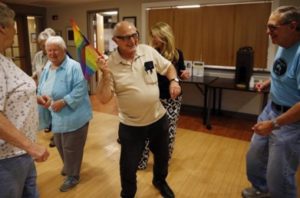
The JTP holds an annual youth camp, including raising significant funds to provide financial assistance for many children.
What is particularly unique about the Justice Theater Project is that, in addition to offering various plays, they pair that with pre-show discussions, highlight community organizations, and provide educational opportunities and outreach. It’s theater and whole lot more!
The Justice Theater project has just announced their exciting 2018 – 2019 season, focusing on women empowered, so totally timely given the state of affairs in our country the past few years. This new season is titled “S/HE IS: Becoming Whole,” and will render performances and discussions about the wholeness of women, including people identifying as women, from a positive perspective and not as the stereotypical victim.
The shows this season include:• October 12 – 28, 2018. A DOLL’S HOUSE by Henrik Ibsen. Directed by JaMeeka Holloway-Burrell. A modern, multicultural, celebrity inspired, selfie-taking, reality TV and social media version of one of the most celebrated classics of female-centric theatre with its then shocking, now progressive final moments.
• November 15-18, 2018. Staged Reading. I AM MY OWN WIFE by Doug Wright. Directed by Jackson Cooper. Charlotte von Mahlsdorf was an elegant and eccentric 65-year-old German transvestite, who tells the story of hiding from the Nazis in plain sight as a woman. Winner: 2004 Pulitzer Prize for Drama, Tony Award for Best Play.
• December 14-18, 2018. (6 shows) JTP Annual Holiday Production: BLACK NATIVITY by Langston Hughes. Directed by JaMeeka Holloway-Burrell, Music Direction by Ray Watkins.
• February 8-24, 2019. Main Stage Production. MEN ON BOATS by Jaclyn Backhaus. Directed by Duke professor Jules Odendahl-James. Based on the book THE EXPLORATION OF THE COLORADO RIVER AND ITS CANYONS by John Wesley Powell. An all-woman cast portrays Powell, a stately one-armed army major, and his 10-man 1869 expedition as it wends its way in four boats through perilous waters to create the first official map of the region.
• April 5-7, 2019. Staged Reading. REAL WOMEN HAVE CURVES by Josephina Lopez. Set in a tiny sewing factory in East L.A., the outrageously funny story tells of five full-figured Mexican-American women who are trying to keep their tiny factory from going under. And while they work, and hide from the INS, they talk… about their husbands and lovers, their children, their dreams for the future.
• June, 7-23, 2019 JTP’s Main Stage season musical finale: CAROLINE, OR CHANGE by Jeanine Tesori and Tony Kushner. Featuring a virtuosic score by Jeanine Tesori (Shrek The Musical, Thoroughly Modern Millie), it blends blues, gospel and traditional Jewish melodies. In 1963, the Gellman family and their African-American maid, Caroline, live in sleepy Lake Charles, Louisiana. Caroline is drifting through life as a single mother of four working in a service job to a white family.
More information and ticket information can be found at their website, www.TheJusticeTheaterProject.org. In addition, the website will list other associated activities around the shows, like panel and book discussions.
Media Contact: Melissa Zeph, Executive Producer, (919)215-0889, [email protected]
Web information: General JTP information and online tickets:
www.TheJusticeTheaterProject.org
(919)264-7089
[email protected]



